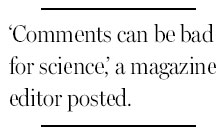Readers without a forum
Updated: 2013-10-13 08:24
By Pam Belluck(The New Tork Times)
|
|||||||
Care to comment on a Popular Science article - say, "These Magnetic Nanobots Could Carry Drugs Into Your Brain" or "FYI: Do Animals Have Orgasms?"
That's not possible - not anymore. Last month, the magazine, known for a chatty, pop-culture approach to serious science, announced that it was shutting off online comments. "Comments," an editor wrote in an online post, "can be bad for science."
The magazine said that vicious, insulting or ignorant comments can pollute otherwise intelligent online discussions and undermine public understanding of science itself. "Trolls and spambots," it said, sometimes hijacked the conversation, particularly on divisive issues like climate change and evolution.
For example: "BUNK," one commenter said of an article posted in August about scientists finding fossil evidence that mammals weren't the first creatures with fur. "What this actually shows is that evolution is still nonsense and doesn't work."
Even on sites where comments are actively screened - like nytimes.com - people who think evolution is bunk are generally permitted to voice their view, often to be shouted down by others; for some readers, following such comment threads is part of the fun. But Popular Science and other publications do not have the resources to moderate all comments, so personal attacks and other bits of ugliness can slip in.
Still, the move to silence what many online readers consider a digital town square has ignited a burst of reaction from bloggers and commentators, as well as editors at other science magazines.
"Unless a comment stream is actively moderated, it inevitably is ruined by bullies, hotheads and trolls," James Fallows wrote, explaining why he does not allow comments on his columns on The Atlantic's Web site.
But others called Popular Science's move too extreme, disagreeing that public support for science could be imperiled by unbridled comments.

"I have to say I don't think comments are bad for science," Fred Guterl, executive editor of Scientific American, said. "To a point I think it's good when people talk about things and try their ideas out."
To justify its ban, Popular Science cited a study at the University of Wisconsin-Madison suggesting that people's perceptions of the riskiness of a scientific advance can become more polarized after reading comments written in an uncivil tone.
Popular Science's online content director, Suzanne LaBarre, wrote that the study implies a discomfiting spiral: "commenters shape public opinion; public opinion shapes public policy; public policy shapes how and whether and what research gets funded."
Ms. LaBarre said Popular Science could not afford comment moderators.
At Nature, public comments are removed if editors or readers flag them as abusive or as spam, Noah Gray, a senior editor, said.
"There's no doubt that uncivil discourse is bad for science," Dr. Gray said by e-mail.
But, he said, comments can be very valuable, sometimes pointing out errors or alternative interpretations of the facts and theories presented in the article.
The study found that people who read uncivil comments ended up more polarized in their views of the technology than those who read civil comments. Those who started off with a negative view of the technology thought it was even riskier when they read a comment like "This is a risk, you idiot," said Dietram Scheufele, one of the researchers.People who started off with a positive view thought it was even safer when they read "You're stupid - this is a benefit."
"There's no way that a completely unmoderated discussion is not going to be detrimental to the facts," Dr. Scheufele said.
While the magazine did not allow readers to comment on its no-comment announcement, it did permit comments on a post that quoted from reader e-mails and Facebook messages.
One e-mail, from Nick Anglewicz, said: "I think you've made the right decision, thanks for the explanation," he wrote. "Now if only I could state my opinion on your post publicly on the Web site."
The New York Times
(China Daily 10/13/2013 page10)